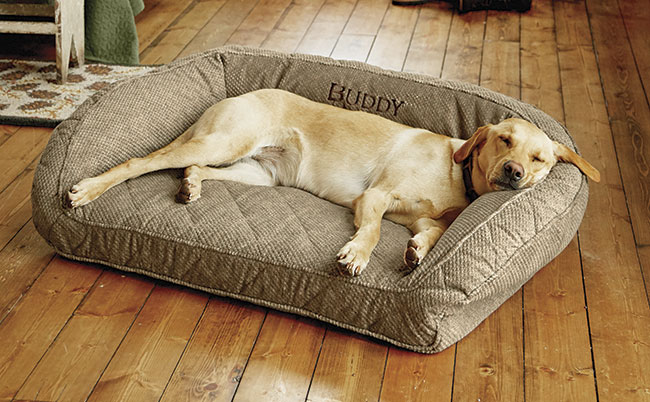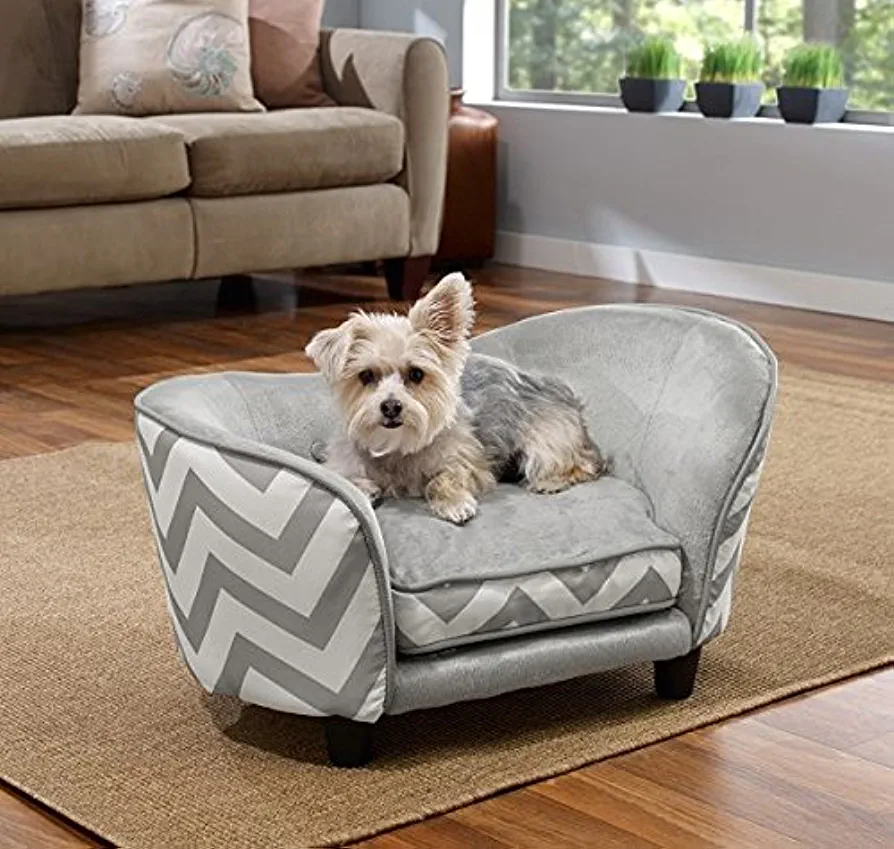In the eternal quest to keep our furry friends comfortable, there is often a debate surrounding the ideal type of bed for dogs. The question that lingers in the minds of pet owners everywhere is whether dogs prefer hard or soft beds. While it may seem like a trivial matter, the answer to this question could greatly impact the quality of sleep and overall well-being of our beloved canines. Let’s explore this intriguing topic and unravel the mystery behind our four-legged companions’ bed preferences.
Factors to Consider
When it comes to choosing the right bed for your furry friend, there are a few important factors to consider. These factors include the size and weight of your dog, their age and health, as well as their sleeping positions and preferences.
Size and Weight of the Dog
The size and weight of your dog play a crucial role in determining the type of bed that will be most suitable for them. Larger and heavier dogs may require a bed that is more durable and supportive in order to properly support their weight. On the other hand, smaller dogs may prefer a bed that provides a cozy and secure environment.
Age and Health of the Dog
The age and health of your dog is another important factor to consider when choosing a bed. Older dogs or those with arthritis or joint issues may benefit from a bed that offers more cushioning and pressure relief to alleviate any discomfort. Additionally, puppies and younger dogs may require a bed that can accommodate their growth and provide them with enough space to stretch out.
Sleeping Positions and Preferences
Observing your dog’s sleeping positions and preferences can also help guide your decision in choosing the right bed. Some dogs prefer to sprawl out and take up a lot of space, while others may prefer to curl up in a more enclosed and cozy space. Taking note of these preferences can help ensure that your dog is comfortable and relaxed in their bed.
Benefits of Hard Beds for Dogs
While hard beds may not sound particularly comfortable to us humans, they do offer several benefits for our canine companions.
Supports Joint Health
One of the main benefits of hard beds for dogs is that they provide excellent support for their joints. The firm surface of a hard bed helps to distribute your dog’s weight evenly, reducing the pressure on their joints and preventing any potential discomfort or pain.
Prevents Body Aches and Pain
Hard beds can also help prevent body aches and pain in dogs. The firm surface promotes proper alignment of the spine, reducing the risk of developing muscle strain or stiffness. This can be particularly beneficial for dogs that are prone to certain musculoskeletal conditions.
Helps with Posture and Alignment
Just like humans, dogs can also develop poor posture and alignment if they consistently sleep on a bed that does not provide adequate support. Hard beds can help promote proper posture and alignment by preventing the sinking or sagging that can occur with softer beds. This can ultimately contribute to your dog’s overall health and well-being.
Advantages of Soft Beds for Dogs
While hard beds offer several benefits, soft beds also have their own advantages that can cater to the specific needs of your dog.
Provides Comfort and Coziness
Soft beds are known for providing dogs with a sense of comfort and coziness. The plush and cushioned surface offers a gentle and inviting space for your dog to rest and relax. This can be especially comforting for dogs that are anxious or require extra support due to their age or health conditions.
Offers Cushioning and Pressure Relief
One of the top advantages of soft beds is the cushioning they provide. Dogs that are prone to body aches or have sensitive joints may benefit from the added cushioning and pressure relief that a soft bed offers. This can help alleviate any discomfort and provide a soothing environment for your pup.
Ideal for Senior and Arthritic Dogs
Soft beds are often recommended for senior dogs and those with arthritis or other joint issues. The extra padding and cushioning can help relieve the pressure on their joints, providing them with a more comfortable and supportive sleeping surface. Additionally, the softness of the bed can help alleviate any pain or stiffness that may be associated with these conditions.
Matching Bed Type to Dog Breed
Different dog breeds have different needs and preferences when it comes to their sleeping arrangements. Here are some recommendations for matching the bed type to specific dog breeds.
Large and Giant Breeds
Large and giant breeds, such as Great Danes and Newfoundlands, require beds that can accommodate their size and weight. Orthopedic memory foam beds are often a great option for these breeds, as they provide the necessary support and comfort for their joints. Additionally, beds that are elevated off the ground can also be beneficial for larger breeds to help distribute their weight more evenly.
Small and Toy Breeds
Small and toy breeds, like Chihuahuas and Pomeranians, may prefer beds that are cozy and secure. Soft beds with raised edges or bolsters can provide a sense of security and comfort for these smaller pups. However, it’s important to choose a size that allows them to stretch out comfortably as well.
Medium-sized Breeds
For medium-sized breeds, such as Beagles and Border Collies, it’s important to find a bed that offers a balance of support and comfort. Beds that have a medium-firmness and a removable, machine-washable cover can be a practical choice for these breeds. This allows for easy cleaning and maintenance, while still providing the necessary support for their joints and muscles.
Choosing the Right Bed Material
The choice of bed material is another crucial aspect to consider when selecting a bed for your dog. Here are some popular bed materials and their benefits.
Orthopedic Memory Foam
Orthopedic memory foam is a top choice for dogs with arthritis, joint issues, or older dogs. This material conforms to your dog’s body shape, providing personalized support and relieving pressure points. It can help alleviate pain and discomfort, while promoting a restful and comfortable sleep.
Egg Crate Foam
Egg crate foam, also known as convoluted foam, is another popular option for dog beds. This material provides a soft and supportive surface that distributes your dog’s weight evenly. It can help prevent bed sores and provide relief for dogs with joint or muscle pain.
Polyester Fill
Polyester fill is commonly used in softer beds and provides a plush and comfortable sleeping surface. It offers a gentle cushioning effect and is suitable for dogs that prefer a cozy and soft bed. However, it may not provide as much support for dogs with joint or mobility issues.
Features to Look for in Dog Beds
When searching for the perfect bed for your dog, there are certain features that you should keep in mind to ensure their comfort and convenience.
Waterproof and Easy-to-Clean
Dogs can sometimes have accidents or spill water on their beds, so choosing a bed with a waterproof and easy-to-clean cover is essential. This allows for quick and hassle-free clean-up, preventing any lingering odors or stains.
Non-Slip Bottom
A non-slip bottom is particularly important if your dog has a tendency to move around or scratch at their bed. This feature ensures that the bed stays in place, providing stability and security for your furry friend.
Removable and Machine-Washable Cover
Dog beds can become dirty over time, so having a removable and machine-washable cover is a great convenience. Being able to easily remove and clean the cover helps to maintain a clean and hygienic sleeping environment for your dog.
Importance of Proper Bed Size
Choosing the right size of bed for your dog is crucial to ensure their comfort and well-being. Here are a few reasons why proper bed size is important.
Allowing Adequate Space
A bed that is too small for your dog can result in them feeling cramped and uncomfortable. It’s important to choose a bed size that allows your dog to stretch out fully and move around freely without restrictions. This will provide them with the necessary space to relax and sleep comfortably.
Considering Dog’s Sleeping Habits
Observing your dog’s sleeping habits can help you determine the ideal bed size for them. If your dog tends to sleep in a stretched out position, a larger bed would be more suitable. On the other hand, if your dog prefers to sleep curled up, a smaller bed with raised edges may be a better fit.
Accommodating Growth and Ageing
Puppies grow quickly, so it’s important to choose a bed that can accommodate their growth. Investing in a bed that offers enough room for your puppy to grow into can save you from having to purchase multiple beds as they mature. Similarly, older dogs may benefit from a larger bed that provides them with comfort and support as they age.
Tips for Finding the Perfect Bed
Finding the perfect bed for your dog may require some trial and error. Here are a few tips to help you in your search.
Consulting with a Vet or Canine Specialist
If you’re unsure about which type of bed would be best for your dog, don’t hesitate to consult with a veterinarian or canine specialist. They can provide valuable insight and recommendations based on your dog’s specific needs and health conditions.
Testing Different Bed Types
Consider testing out different types of beds to see which one your dog prefers. Some dogs may lean towards a firmer bed, while others may gravitate towards softer options. By observing their behavior and comfort level on different beds, you can make a more informed decision.
Taking the Dog’s Preferences into Account
Your dog’s preference and comfort are of utmost importance when selecting a bed. If they have a favorite sleeping position or tend to favor a certain type of material, take these preferences into account when making your decision. Providing a bed that aligns with their individual needs and preferences will ensure their ultimate comfort and satisfaction.
Common Misconceptions
There are a few common misconceptions when it comes to choosing dog beds. Let’s debunk some of them.
All Dogs Have the Same Bed Preference
Contrary to popular belief, not all dogs have the same bed preference. Each dog is unique and may have different comfort needs and preferences. While some may prefer a firm and supportive bed, others may find a soft and cozy bed more comfortable. It’s important to take your dog’s individual needs and preferences into consideration when choosing a bed.
Soft Beds Are Always Better
While soft beds can offer comfort and coziness, they may not be the best option for all dogs. Dogs that require additional support for their joints or have certain health conditions may benefit more from a firmer bed. It’s important to consider your dog’s specific needs and consult with a professional to determine the best bed type for them.
Hard Beds Are Uncomfortable
Although hard beds may not sound comfortable to us humans, they can provide the necessary support and health benefits for dogs. The firm surface promotes proper joint alignment and can help prevent discomfort and body aches. Some dogs may actually prefer the support and stability that a hard bed offers.
Conclusion
Ultimately, choosing the right bed for your dog involves considering their size, age, and specific needs, as well as their sleeping preferences. Hard beds offer benefits such as joint support and pain prevention, while soft beds provide comfort and cushioning. Matching the bed type to your dog’s breed, as well as selecting the right bed material and size, is essential for their overall well-being. Additionally, considering features like waterproof covers, non-slip bottoms, and machine-washable options can make the bed more convenient for both you and your furry friend. By taking the time to find the perfect bed, you can ensure that your dog has a comfortable and restful sleep every night.










